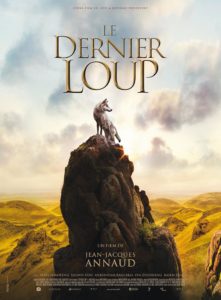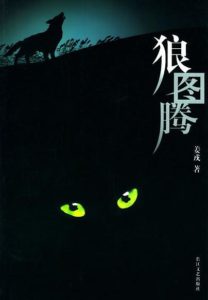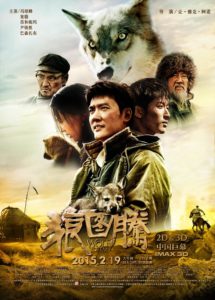Wolf Totem
狼图腾
China/France, 2015, colour, 2.35:1, 3-D (China only), 121 mins.
Director: Jean-Jacques Annaud.
Rating: 7/10.
A very respectable version of an iconic Mainland novel about the relationship between Man and Beast.
Inner Mongolia, 1967, the second year of the Cultural Revolution. Chen Zhen (Feng Shaofeng) and his friend Yang Ke (Dou Xiao) are among the first students to volunteer to “go to the countryside” – to live locally and help educate peasants. By volunteering for Inner Mongolia, they’re also glad of a chance to escape the current harsh life in Beijing. They are taken by the area’s new production head, Bao Shungui (Yin Zhusheng), to stay with a brigade led by Bilig (Baasanjav Mijid), who has a son, Batu (Baoyin’gexige), a daughter-in-law, Gasma (Ankhnyam Ragchaa), and a baby grandson, Bayar (Xilindule). Chen Zhen and Yang Ke are to stay for two years. Six months later Chen Zhen gets lost in the hills on his horse one day and finds himself  surrounded by a pack of wolves. He manages to escape by frightening them off with a bell; but the incident gives him a fascination with wolves and their place in Mongolian culture, and he dreams of raising a cub sometime. That winter another brigade raids the wolves’ “larder” of gazelles in a frozen lake and the following spring Bilig, against his will, is ordered by Bao Shungui to round up and kill all wolf cubs. Both actions disturb the relationship in the grasslands between Man and Wolf, and increases the wolves’ anger. One night, during a snow blizzard, the wolves attack a prize herd of PLA horses that Bao Shungui had put in the care of Bilig’s brigade. Because of the loss, the brigade is reprimanded, but not punished, as Batu, who was in charge of the herd, had died that night. Meanwhile, a wolf cub that Chen Zhen had found and been secretly raising is discovered. Bilig is angry with him but Bao Shungui allows him to continue when he says it is part of an experiment. Nevertheless, Chen Zhen promises Yang Ke that he’ll release the cub when the brigade reaches its summer camping grounds by Swan Lake, a sufficiently peaceful site for it to survive after being hand-reared. But due to famine in the east, new settlers have arrived at Swan Lake and the area is no longer as idyllic as before.
surrounded by a pack of wolves. He manages to escape by frightening them off with a bell; but the incident gives him a fascination with wolves and their place in Mongolian culture, and he dreams of raising a cub sometime. That winter another brigade raids the wolves’ “larder” of gazelles in a frozen lake and the following spring Bilig, against his will, is ordered by Bao Shungui to round up and kill all wolf cubs. Both actions disturb the relationship in the grasslands between Man and Wolf, and increases the wolves’ anger. One night, during a snow blizzard, the wolves attack a prize herd of PLA horses that Bao Shungui had put in the care of Bilig’s brigade. Because of the loss, the brigade is reprimanded, but not punished, as Batu, who was in charge of the herd, had died that night. Meanwhile, a wolf cub that Chen Zhen had found and been secretly raising is discovered. Bilig is angry with him but Bao Shungui allows him to continue when he says it is part of an experiment. Nevertheless, Chen Zhen promises Yang Ke that he’ll release the cub when the brigade reaches its summer camping grounds by Swan Lake, a sufficiently peaceful site for it to survive after being hand-reared. But due to famine in the east, new settlers have arrived at Swan Lake and the area is no longer as idyllic as before.
REVIEW
Shot for over a year on the grasslands of Inner Mongolia, and planned even longer before that, Wolf Totem 狼图腾 is a very respectable version of an iconic, semi-autobiographical Mainland novel centred on a Beijinger during the Cultural Revolution who tries to raise a wolf cub in the wilds. Apart from a few blips, the film manages to avoid most of the usual cliches of ethnic, landscape and wildlife dramas, though the human story is never on a par with the animal one. Despite that, septuagenarian French director Jean-Jacques Annaud gets the balance right most of the time, making Wolf his best movie for a long, long time – since The Bear L’ours (1988), in fact. Mainland audiences responded enthusiastically (RMB704 million) and it only lost out on being accepted as the nominee for the Best Foreign-Language Film Oscar as too many of the key creatives weren’t Chinese.
 The Academy and its rulebook had a point; and simply in tempo and editing the film does feel more like a European production shot in the Mainland. However, its source material is authentically Chinese: the 2004 novel of the same name by Jiang Rong 姜戎 (pen name of Lv Jiamin 吕嘉民) was based on his own experiences on Inner Mongolia’s grasslands during the 1960s and 1970s (see left). With fictional characters based on himself and others, the book, which took Jiang over 30 years to finally publish, deals with the delicate balance in that environment between Mongolian superstition and Chinese practicality, plus the inter-relationship between humans, wolves, wildlife and climate. The script – by Annaud regular Alain Godard, plus Lu Wei 芦苇 (Tuya’s Marriage 图雅的婚事, 2006) and the UK’s John Collee (Paper Mask, 1990) – sticks fairly closely to Jiang’s novel, which is not uncritical of Party policy during the Cultural Revolution and the way in which it often clashed with Inner Mongolians’ traditional beliefs in the balance of nature and especially Man’s relationship with the grasslands’ main predator, the Wolf.
The Academy and its rulebook had a point; and simply in tempo and editing the film does feel more like a European production shot in the Mainland. However, its source material is authentically Chinese: the 2004 novel of the same name by Jiang Rong 姜戎 (pen name of Lv Jiamin 吕嘉民) was based on his own experiences on Inner Mongolia’s grasslands during the 1960s and 1970s (see left). With fictional characters based on himself and others, the book, which took Jiang over 30 years to finally publish, deals with the delicate balance in that environment between Mongolian superstition and Chinese practicality, plus the inter-relationship between humans, wolves, wildlife and climate. The script – by Annaud regular Alain Godard, plus Lu Wei 芦苇 (Tuya’s Marriage 图雅的婚事, 2006) and the UK’s John Collee (Paper Mask, 1990) – sticks fairly closely to Jiang’s novel, which is not uncritical of Party policy during the Cultural Revolution and the way in which it often clashed with Inner Mongolians’ traditional beliefs in the balance of nature and especially Man’s relationship with the grasslands’ main predator, the Wolf.
Though the film is set during the first, heady years of the Cultural Revolution, politics – though always shaping events in the background – plays second fiddle to the natural world, which in Inner Mongolia basically means landscape. It’s a subject that has stalked Annaud’s film career, whether in Central Africa (Black and White in Color La victoire en chantant, 1976), Paleolithic Europe (Quest for Fire La guerre du feu, 1981), the Canadian wilderness (The Bear), Tibetan plateau (Seven Years in Tibet) or Russian winter (Enemy at the Gates, 2001). Thanks to the good-looking but unforced photography by French d.p. Jean-Marie Dreujou – with whom Annaud has worked since his tiger movie Two Brothers Deux frères (2004) – the vast Inner Mongolian landscape is a partner in events, along with the humans and wolves, rather than dominating the action. It’s one of several ways in which the film sidesteps cliches like over-doing CR political fervour, over-humanising the wolves (VFX work is immensely subtle) and over-romanticising the Mongolian way of life.
As a result, it’s immediately noticeable when the film-makers do slip into cliches, such as the tendency of an old Mongol brigade leader (played by veteran Baasanjav Mijid 巴森扎布, Aravt: Ten Soldiers of Chinggis Khaan 阿尔巴特, 2012) to speak in noble parables and the budding romance between Our Handsome Han Hero and A Beautiful Mongolian Widow in the latter half. But generally the script steers a middle path, enhanced by the European-style rhythm of Reynald Bertrand’s editing and US composer James Horner’s score that avoids ethnic colouring in favour of a broad, neutral feel reflecting the drama’s earth-and-sky stage.
The main problem is the bland lead performance by Feng Shaofeng 冯绍峰 as the author’s stand-in, Chen Zhen. An actor who’s better at lighter roles, Feng doesn’t dominate the film in the way he should and is even outperformed by his more empassioned co-star, Mainland-born, Vancouver-raised Dou Xiao 窦骁 [Shawn Dou], whenever the two are on screen together (which isn’t much). Until her role is brought to centre stage in the latter half, Mongolian actress Ankhnyam Ragchaa 昂和妮玛 doesn’t make much impact, apart from meaningful looks at the camera. It’s largely theatre-TV actor Yin Zhusheng 尹铸胜 – so good as the nonsense-spouting official in A Stupid Journey 江湖论剑实录 (2014) – who’s the most consistent dramatic presence, playing the area’s new production head (and effective political commissar) with a subtle sense of conflict between duty and common sense.
A special nod should also be given to d.p. Yang Tao 杨涛 (Full Circle 飞越老人院, 2012) and editor Fang Yuan 方媛, who were responsible for the film’s action highlight, a grittily shot and propulsively cut seven-minute sequence of a wolf attack on a herd of horses during a blizzard. More human drama of that kind of intensity would have benefited the film overall, but as it is Wolf Totem is still well worth a look.
CREDITS
Presented by China Film (CN), Beijing Forbidden City Film (CN), Repérage (FR).
Script: Alain Godard, Jean-Jacques Annaud, Lu Wei, John Collee. Novel: Jiang Rong. Photography: Jean-Marie Dreujou (general), Yang Tao (horse-attack sequence). Editing: Reynald Bertrand (general), Fang Yuan (horse-attack sequence). Music: James Horner. Production design: Quan Rongzhe. Art direction: Li Chuanyong. Costumes: Wang Rong. Styling: Ma Yingbo. Sound: Wang Gang, Cyril Holtz. Special effects: Xiao Jin, Xia Jianping. Visual effects: Guo Jianquan, Christian Rajaud (VHQ Beijing Digital Media, Base FX, Pixomondo, Illumina Visual Effects). 3-D: David Bush. Wolves training: Andrew Simpson, Sally Jo Sousa.
Cast: Feng Shaofeng (Chen Zhen), Dou Xiao [Shawn Dou] (Yang Ke), Ankhnyam Ragchaa (Gasma, Batu’s wife), Yin Zhusheng (Bao Shungui), Baasanjav Mijid (Bilig), Baoyin’gexige (Batu, Bilig’s son), Tumenbayar (Shartseren, Batu’s assistant), Xilindule (Bayar, Batu’s son), Bao Hailong (Lamjav), Baduo (bony settler), Danba (shopkeeper), Qi’naritu (Gertai), Han Tongsheng (city doctor), Huang Xiaolei (nurse), Zhou Bo (barefoot doctor), Zhuola (Yang Ke’s girlfriend), Qilemuge (Yang Ke’s second girlfriend).
Release: China, 19 Feb 2015; France, 25 Feb 2015.
